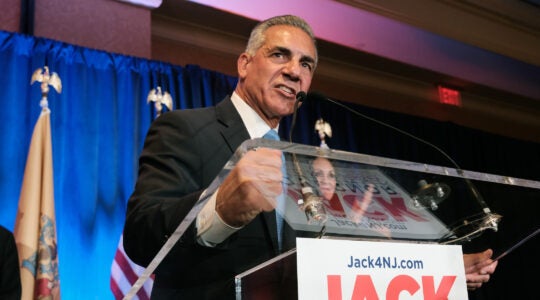So how exactly did Nefesh B’Nefesh and the Jewish Agency for Israel — two organizations with a long-running rocky relationship — manage to make common cause and work together (as I reported last week)?
The philanthropist behind Nefesh explains.
“It is something that took a while to happen, and not because there is any personal animosity but because it is two organizations and two different ways of achieving the same goal,” said Tony Gelbart, the Florida-based real estate mogul who has pumped millions of dollars into Nefesh since he helped found the organization eight years ago. “It is something that is different. It is new.”
A partnership between Nefesh, which gives Diaspora Jews grants to move to Israel, and the Jewish Agency, which has overseen aliyah since Israel’s founding, seemed like a natural fit when the two struck a deal two years ago to promote aliyah together. Nefesh would take care of the marketing and promotion of immigration, while the Jewish Agency would handle the technical end of bringing new immigrants to the Jewish state.
But coalescing — especially when professional staffs operate differently and some lay leaders opposed the deal – took time, Gelbart told me. Last week marked the first time the two groups sent out their first co-branded mass e-mail, announcing joint aliyah workshops. It was a big step.
“I think we got married before we did the courtship,” Gelbart said. “Two years ago we got married, and then decided, ‘OK. Let’s see how it’s going to work.’ When you get married, not everyone agrees, and not everyone agrees with the marriage in the family.”
Before the two organizations could work together efficiently, they had to align their missions and reach agreement on best practices. Gelbart also conceded that the “emotional aspect” sometimes interfered.
“Cooperation for any organization is difficult,” he said. “The way we did this was very simple: We just put down a list of all the things we agree on — we both want to help people make aliyah — and a list of things we did not agree on. It was remarkable that the list we agreed on was much larger that the list we didn’t.
"Then we figured out how to move each item from the list we disagreed on to the one we agreed on. It took some time."
For years, aliyah had been the primary focus of the Jewish Agency. Over time, however, its mission has shifted to include helping Diaspora Jews generally and building Jewish identity. That mission shift became official earlier this year when its new chairman, Natan Sharansky, pushed through a strategic revisioning of the organization.
Nefesh is solely interested in aliyah.
“The Jewish Agency is exactly what it is — the Jewish Agency — not the Aliyah Jewish Agency or the Identity Jewish Agency or the Education Jewish Agency,” Gelbart said. “They are the No. 1 organization for Jews in need to lean on. They are making partnerships with Nefesh B’Nefesh, Birthright Israel and so on. We realized if we work with them, perhaps they can become the parent agency.”
Fundermentalist’s take: In our conversation, it became clear that Gelbart believes the two organizations could not have coalesced without Sharansky at the Jewish Agency’s helm.
When the former Soviet dissident became chairman a little more than a year ago, he brought huge cachet; his name alone brought some confidence to the embattled organization. While many expressed optimism that perhaps Sharansky could effect some change, the skeptics were many — myself among them.
But over the past year, Sharansky has redirected the Jewish Agency internally, reconstituted its staff and moved the core of its fund-raising operation to New York from Israel. Externally he has been able to strengthen ties with the agency’s most vocal critics, including Charles Bronfman and Robert Goldberg.
Sharansky even played a central role in convincing his longtime political ally, Israeli Prime Minister Benjamin Netanyahu, to step in to quell the firestorm over a proposed Israeli law to overhaul conversion that had sparked anger among Diaspora Jewish movements.
Beyond that, insiders say that as the Jewish Agency and the American Jewish Joint Distribution Committee neared an agreement with the Jewish Federations of North America over how to split more than $100 million per year of federation-raised money, Sharansky’s weight and muscle forced the JDC to take his agency more serious, and that helped move negotiations along after a multi-year impasse.
It almost seems too good to be true. But Gelbart’s explanation of how Sharansky worked with him and Nefesh provides some insight into Sharansky’s mammoth first-year success.
“I can tell you that the moment he came into the Jewish Agency, we spoke,” Gelbart said. “Before that we spoke, and after that we spoke. He has been incredibly hands-on. He is not afraid to pick up the phone and discuss an issue, instead of sending someone to discuss it for him."
Also, Gelbart added, Sharansky “is not afraid to take a stand.”
That has not always been the modus operandi of the Jewish Agency head. Gelbart, who has long known Sharansky, says he was a believer from the beginning. But working with Sharansky has solidified Gelbart’s faith.
“The guy is just a very brilliant guy who understood the job he was taking. He could have sat there with the status quo, but he said, ‘No, I am taking this job because I want to change it,’ " Gelbart said.
Noting the many personalities within the Jewish Agency all over the world, Gelbart said "getting them all on the same page, that is a miracle. And I think he has pulled it off.”
JTA has documented Jewish history in real-time for over a century. Keep our journalism strong by joining us in supporting independent, award-winning reporting.





